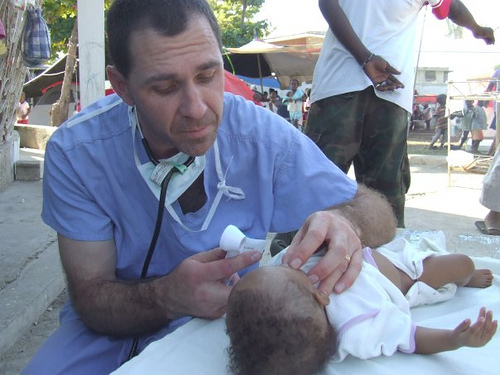
Dr. David Collins treats a child in Haiti. Photo courtesy of Salvation Army
By BRANDON HOWELL
Capital News Service
LANSING – Southwest Michigan has responded strongly to the disastrous earthquake that has imperiled Haiti, even while some of the means remain unclear.
“The local people have been wonderful,” said Angie Laskarides, executive director of the Berrien County chapter of the American Red Cross. “They’re very aware of what’s going on and they really want to support this effort.
“It’s similar to the response after Katrina,” Laskarides said. “We don’t have as many local people who have loved ones in Haiti as we did with Katrina. But for this one, there’s been an outpouring of money and people saying, ‘How can I help?’”
Laskarides said the Berrien County chapter had raised more than $7,800 in donations as of Jan. 20 by mail and walk-ins since the disaster occurred. “I’m sure there’s much more being done online,” she added. “About 60 percent of donations are generally online through national headquarters.”
Laskarides added that the American Red Cross can most benefit Haiti at this point by raising money and awareness.
“We can’t do anything else,” she said. “It’s not our show, so to speak. It’s the Haitian government, the United Nations and the International Federation of the Red Cross and Red Crescent Societies response, and we’re just one member of that team as an American Red Cross.”
Lakeland HealthCare, Southwest Michigan’s largest hospital system, is also contributing to the relief effort and has put together a medical team of doctors and other health professionals that is working in Haiti.
Sandi Lemley, practice administrator for Rappha Medical Center in St. Joseph, said the team flew to the capital, Port-au-Prince, and set up a base hospital with help from the Salvation Army and Missionary Flights International.
Led by Dr. Sherry O’Donnell, the Lakeland team includes four from Berrien County, two from the Grand Rapids area, one from Van Buren County and one from the Detroit area.
The team includes: Drs. David Collins of Intercare Community Health in Eau Claire and Michael Mayle of Coloma; Lakeland nurse Nancy Redman from; Vicki Shembarger of the Berrien Regional Educational Service Agency; Cherisse Tornga, a physician’s assistant from the Grand Rapids area; support staffers Kevin Tornga of the Grand Rapids area and Rod Mayo of Hartford; and Dr. Karl Bandlien, a surgeon from Westland.
“The physicians are all very experienced,” Lemley said. “They work hand in hand with the Salvation Army in disaster relief efforts, especially as it pertains to medical intervention for treatment of injuries people have sustained in the earthquake.”
Lemley said the project came together “just hours” after the earthquake struck. Several key contributors made the effort possible.
“Lakeland HealthCare gave us boxes of medications, IVs, things that they could take for the Haitian people,” she said. “The Whirlpool Corp. made a very generous donation for the transportation of the team.
“We maintain a mission warehouse here at Rappha Medical Center, so we were able to pack 1,000 pounds of medical supplies out of our warehouse in a very short period of time,” she said.
While donations of food and clothing might seem like a good idea, Laskarides cited the hectic conditions on the ground in Haiti to explain why no such donations are currently being accepted in Southwest Michigan.
“It’s a logistical nightmare on the ground,” she said, “and agencies are already overwhelmed with coordinating that because of the limitations at the airport and the port itself being closed.”
Laskarides added that many people have informed her that they want to go to Haiti to help, but effective relief work in the country requires technical training and the ability to speak French Creole.
There will continue to be much work ahead, said Laskarides. “This will be an ongoing relief effort, and after the national media is done covering it the people from the Red Cross societies, the U.N. and the various governments will still be there providing relief.”
“Right now, we’re just doing food, shelter, clothing, medicines and surgery, but things are going to have to be rebuilt. In order for Haiti to survive, we’re going to have to be in it for the long haul,” she said.
© 2010, Capital News Service, Michigan State University School of Journalism. Not to be reproduced without permission.
Story as a Google Doc